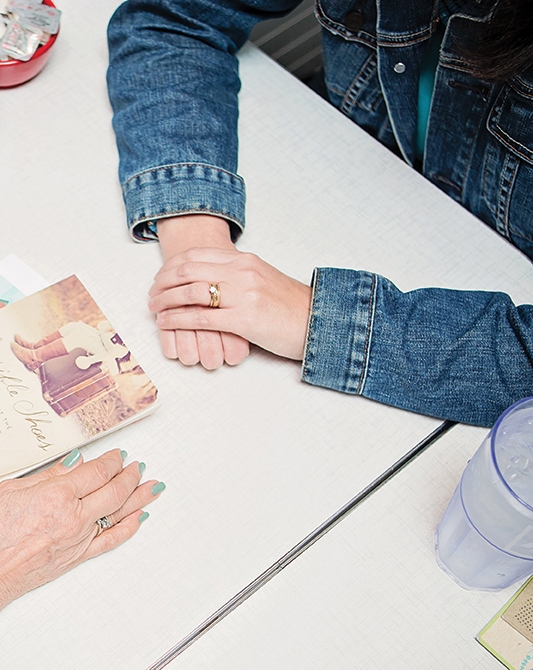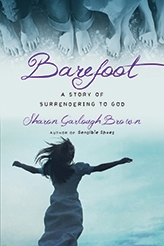[vc_row][vc_column][vc_column_text]

[/vc_column_text][/vc_column][/vc_row][vc_row el_class=”hero-header-text”][vc_column][vc_column_text]
She’s Got Sole
Sensible Shoes author Sharon Garlough Brown on the inspiration behind her best-selling series and how success has changed her own journey in ministry
By Judi Geake | Photographs by: Stacey Clack | September 19, 2016
[/vc_column_text][/vc_column][/vc_row][vc_row][vc_column][vc_column_text]
Since her first book was published in 2013, Sharon Garlough Brown’s readers have been avid fans. One of those readers, Judi Geake, also leads discussion groups at her church based on the books. Recently she visited Sharon to talk about spiritual disciplines, the writing process, and how she found the Covenant Church.
[/vc_column_text][/vc_column][/vc_row][vc_row][vc_column][vc_column_text]
Q –How did you decide to write your first book, Sensible Shoes?
I was a shy and introverted girl, and writing stories was a way for me to escape into imaginary worlds. As a teenager, I started journaling and keeping notebooks filled with dialogue that I recorded from significant conversations with friends and family. It was good practice in listening, both to my inner life and to my interactions with others. I still have those journals and notebooks, some filled with fledgling ideas for stories I never completed.
Then in seminary I wrote a sermon based on the story of Peter walking on water. The more I wrestled and prayed with the text, the more I saw the possibility for expanding it into a book. “This is it!” I thought. “This is the book I’m meant to write!” So I started compiling chapters and worked on it for a couple of years.
One night my husband, Jack, brought me the news that John Ortberg had just published a book with the exact same title: If You Want to Walk on Water, You’ve Got to Get Out of the Boat. I was devastated, convinced that my one good idea was my only good idea. I honestly believed that my slowness to “write the book God had given me” meant that my writing dream was over.
But seven years later, the nudge to get out of the boat and walk on water by writing fiction rather than nonfiction became a call I could not ignore.
Q –Sensible Shoes is a novel about spiritual growth that includes quite a bit of teaching about spiritual disciplines. How did you choose this format?
In September 2008 I started leading a weekly spiritual formation group for women. We explored spiritual disciplines that have helped Christians throughout history pay attention to the presence of God, and the movement of the Spirit in transformative ways.
At one of our first meetings, one woman looked around the circle and commented, “Everyone here is wearing really cute but sensible shoes!” The phrase stuck, and we began to refer to ourselves as the “Sensible Shoes Club.” Not only did we need “sensible shoes” for our walk with God, but we needed each other as companions on the journey.
As we walked together, I sensed there was a story to tell—not about our particular lives, but about the power of the Spirit to conform us into the image of Jesus Christ. I began to wonder what would happen if I created four characters who met at a retreat center in order to learn ways to walk more closely with God. And so Meg, Hannah, Mara, and Charissa emerged—each one wrestling with common issues like letting go of control, perfectionism, shame, regret, fear, people-pleasing, and hiding behind roles and busyness.
As for the format, it’s a bit of a hybrid genre. I knew I wanted to write about the Holy Spirit’s power to heal and transform lives, and it seemed the best way to do that was by creating characters who are learning to walk more intimately with God. Sensible Shoes tracks their progress over the course of several months as they’re introduced to spiritual disciplines at a retreat. Spiritual discipline “handouts” are provided in the book so that readers can choose to participate in the retreat along with the characters or simply read the book as story.
I chose fiction because it’s so invitational. Jesus understood the power of story and imagination and used it to reveal the kingdom of God. Story can sneak around our defenses and slip in when we’re least expecting it. As we become invested in a story, characters can serve as mirrors that help us see ourselves more clearly. Story is stealthy. So is the Holy Spirit.
Q –Television personality Kathie Lee Gifford promoted Sensible Shoes on her show. How did that publicity impact you? Did it change the way you approached writing your next book?
 When I got the news that Kathie Lee wanted to feature the book on national television, I was keenly aware of the gravitational pull toward ego, and I had to wrestle my way through it in prayer. But the gift of Kathie Lee’s publicity is that the book was scattered into the hands of people I could never have reached, and that meant kingdom impact. I’m very, very grateful for that.
When I got the news that Kathie Lee wanted to feature the book on national television, I was keenly aware of the gravitational pull toward ego, and I had to wrestle my way through it in prayer. But the gift of Kathie Lee’s publicity is that the book was scattered into the hands of people I could never have reached, and that meant kingdom impact. I’m very, very grateful for that.
Whenever an author writes a sequel to a book that has a devoted audience, there’s always the underlying question about how it will be received. Though I wouldn’t say I felt any pressure as I wrote Two Steps Forward, I was definitely aware of some anxiety as I released it into the world. Would readers who loved Sensible Shoes appreciate the sequel? Or would they be disappointed?
The reality is, Two Steps Forward is different from Sensible Shoes. For one thing, the characters are no longer in retreat together, so the question becomes, what will they remember or forget about what they’ve learned?
It’s also a messy book. After Sensible Shoes was published, I prayed a long time about whether or not God was calling me to write a sequel. As I prayed one day, it occurred to me that nothing particularly tragic happened to any of the characters. They brought a lot of pain to the story, but Sensible Shoes is about people addressing their old wounds and current struggles and seeing how God is at work to transform and heal.
I had the sense then that if I wrote another book, I would need to let life unravel for them. So in some ways, Two Steps Forward required a level of courage that I didn’t need for Sensible Shoes. I certainly grew in the process of writing it.
Q –Many small groups throughout the Covenant are using your books as a springboard to discuss their faith. Why do you think readers connect so powerfully with these characters?
I think readers identify with the characters’ struggles and imperfections, their hopes and fears. I love hearing readers say, “I saw myself in your characters, and now I’m longing for more of what they experienced with God.”
I think the messiness of the characters’ lives offers encouragement and hope. When people realize they’re not alone in their struggles, it’s a gift of grace.
Q –What can readers expect to find in the third book, Barefoot?
 The characters are growing in their confidence in God’s love and grace, and they’re deepening their connections in community. But spiritual growth is never linear, and readers get to witness the characters’ oscillating movement toward God and away from God.
The characters are growing in their confidence in God’s love and grace, and they’re deepening their connections in community. But spiritual growth is never linear, and readers get to witness the characters’ oscillating movement toward God and away from God.
They’re still confronting their fears and resistance. They’re learning to trust God’s heart, even when life is painful. Barefoot took every last ounce of my courage to write because the characters experience significant changes and losses in the story. But my prayer is that readers will encounter God’s faithfulness as they journey with the characters in sorrow and joy.
Q –Do you identify or struggle with any one of your characters in particular?
Some say that a writer’s first novel is thinly veiled autobiography, and I’m definitely in each of the characters in varying degrees, for better and for worse. That wasn’t deliberate—it’s just what emerged. I gave Mara a couple of my own painful childhood experiences, like always being picked last for a team. Meg has some of my fears. Hannah received my overdeveloped sense of responsibility, and Charissa has some of my perfectionistic tendencies.
I think I probably share most in common with Hannah, who is a pastor on sabbatical. Years ago the Lord removed me from ministry for a season so that I could learn that his love for me was not based upon my usefulness or productivity in the kingdom. It was a painful process of pruning, but I’m so grateful for it now.
The character I’ve struggled with the most is the one who, but for the grace of God, I could have become—Charissa, the overachieving control freak. I think we tend to be most frustrated by people who remind us of ourselves, and Charissa certainly shares some things in common with my driven, achievement-oriented younger self. But she’s growing. And I’ve grown in compassion for her. There were moments while writing Sensible Shoes that I’d shut the computer and say aloud, “She’s driving me crazy!” Now I hear myself saying, “Thatta girl, Charissa. Way to go.” I guess that’s progress for both of us.
Q –How did you find the Covenant Church?
Definitely through providence. In 2003 my husband, Jack, and I had been serving a nondenominational church in England for a few years, and we were feeling a tug to return to the States. But we also sensed it was time to transition away from our former denomination. So Jack started researching ministry employment opportunities and one day stumbled upon a job posting for a Covenant church. We had never heard of the Covenant before, so we spent time investigating the CovChurch website, becoming more and more excited as we read. It felt like we had found a home. Six months later we did find a home at Thornapple Covenant Church in Grand Rapids, Michigan, when Jack was called to serve as an associate pastor there. Then in 2006 we transitioned to co-pastoring at Redeemer Covenant Church, Thornapple’s sister congregation in Caledonia, Michigan. We love being part of the Covenant family!
Q –How has your writing changed your ministry?
The biggest change is that I stepped off the pastoral staff at our church in January because of my travel schedule. When I realized I could no longer respond consistently to emergency pastoral care needs or other crises, it was time to embrace the reality that God was entrusting me with a new ministry of reaching people beyond our congregation. Redeemer has been a wonderful home base for me. I’m so grateful for their love, support, and prayers as I say a wholehearted yes to God’s call.
As part of that call, Jack and I are in the process of developing a nonprofit (Abiding Way Ministries) that will focus on providing retreats and resources rooted in the contemplative life. I meet lots of people who are weary and longing for a different way forward with God and with others, a way of truly knowing the height and depth, length and breadth of the love of God. Our prayer is that God will use this ministry to help refresh the hearts of the saints.
[/vc_column_text][/vc_column][/vc_row]














